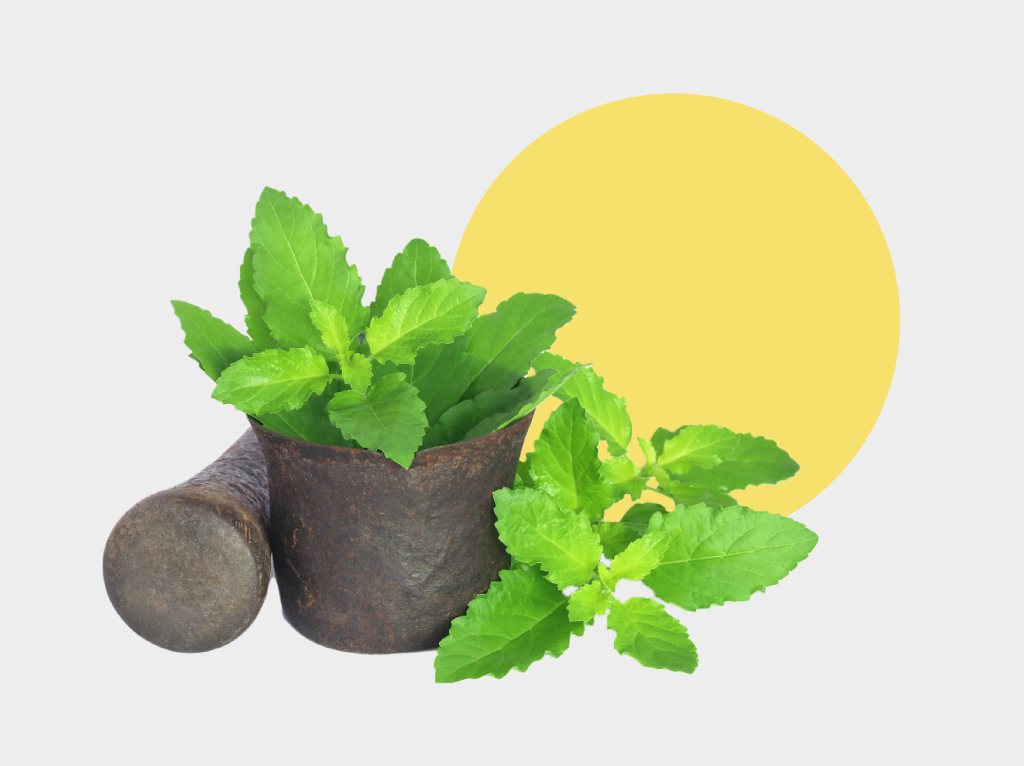The medical uses of tulsi (Holy Basil) have been known since times immemorial in India. Tulsi is believed to improve immunity, cure cold and cough, relaxes the mind and prevents rise in blood pressure levels.
But is Tulsi good for diabetes? How to use Tulsi for diabetes? How many tulsi leaves to eat everyday?
Well, this article will give you an insight on the benefits of tulsi for your overall health.
Tulsi: Nutritional Profile
1 glass (150ml) of tulsi tea contains the following nutrition.
| Calories: 0.6 |
| Vitamin A: 3% |
| Vitamin K: 13% |
| Calcium: 0.5% |
| Iron: 0.5% |
| Manganese: 1.5% |
Advantages of Tulsi For Diabetes
- Reduces stress and anxiety
- Natural immunity booster
- Balances blood pressure
- Used to treat skin infections
- Cures throat problems
- Prevents blood sugar spikes
Ways To Consume Tulsi For Diabetes
You can chew some tulsi leaves daily to benefit from the herb directly. Alternatively, you can have tulsi tea by dropping a few leaves in boiling water and drinking it after a couple of minutes.
You can also soak tulsi leaves in water and leave it overnight, and drink it the following day on an empty stomach.
Tulsi can also be a regular condiment for your food.
Best Time To Consume Tulsi For Diabetes
Various studies by experts have shown that consuming tulsi leaves on an empty stomach fetches the best results in lowering blood glucose.
Therefore, we can safely conclude that early morning is the most effective time to consume tulsi for diabetes.
Risks of Over Consuming Tulsi For Diabetes
- Since tulsi leaves have glucose-lowering properties, diabetics may tend to experience a rapid fall in blood sugar levels if tulsi is overconsumed. This may result in hypoglycemia, which can damage other organs, like the kidneys.
- Tulsi is also very rich in eugenol, which causes damage to the liver, nausea, diarrhoea, and convulsions.
Curious about natural remedies for diabetes? Learn how common herbs and plants could benefit blood sugar control
Other Health Benefits of Tulsi
Tulsi is well-endowed with Vitamin C and zinc and offers multiple health benefits. Its antibacterial, antiviral, and antifungal properties help protect against various infections. Some chief health benefits of tulsi are:
- Works as an immunity booster
- Helps manage stress
- Aids digestion
- It helps maintain blood pressure, keeping it low
- Helps in controlling blood cholesterol levels
- Improves oral hygiene
- Helps control weight by boosting metabolism
Don’t Have Time To Read?
- Tulsi has hypoglycemic properties, which helps in keeping the blood sugar levels under control and mitigate complications arising out of diabetes.
- Tulsi has high nutritional value.
- You may have tulsi by either chewing, making tulsi tea by putting tulsi leaves in boiling water or soaking tulsi leaves overnight in water and having the same next day.
- It is best to have tulsi leaves on an empty stomach. Hence, having tulsi leaves in the morning is the best option.
- Overconsumption of tulsi leaves may lead to a rapid reduction in blood sugar levels leading to kidney ailments.
- Tulsi is well endowed with Vitamin C and Zinc and works as a very good immunity booster.
Common FAQs
1. Is Tulsi/Holy Basil Good For Diabetes?
Yes, consumption of holy basil, also known as Ocimum sanctum, has shown positive effects on people suffering from diabetes. It helps lower blood glucose levels.
2. Which Type of Tulsi Is Best For Diabetes?
Of all tulsi types, holy basil is considered the best in controlling blood sugar levels in diabetics.
3. What Are The Side Effects of Tulsi?
Overconsumption of tulsi may result in side effects like liver damage, nausea, diarrhoea, rapid heartbeat, and convulsions. Since its leaves have hypoglycemic properties, diabetics must avoid consuming it in excess, as it may cause a dangerously rapid drop in blood sugar levels.
4. How Many Tulsi Leaves Should You Eat Per Day?
You may consume 5 to 7 tulsi leaves in a day. Preferably, it should be consumed on an empty stomach. Tulsi is a blood purifier and helps in clearing the toxins in your body. It is also advised to swallow Tulsi leaves rather than chewing them.
5. Can We Drink Tulsi Water Daily?
Yes, you can add a few leaves to boiling water and drink it up daily. It improves bowel movement and has several benefits that improve overall health.

1 comment
[…] Also Checkout: Is Tulsi Good For Diabetes […]